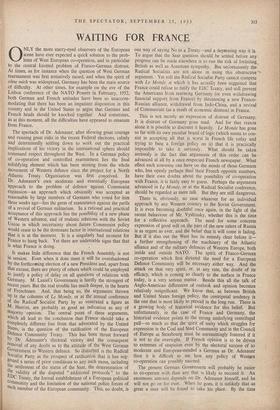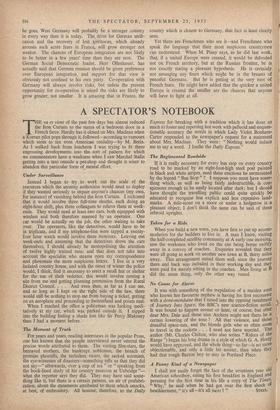WAITING FOR FRANCE
ONLY the more starry-eyed observers of 'the European scene have ever expected a quick solution to the prob- lems of West European co-operation, and in particular to the central knotted problem of Franco-German distrust. At times, as for instance when the question of West German rearmament was first tentatively raised, and when the spirit of ohne mich was widespread, Germany has been the main source of difficulty. At other times, for example on the eve of the Lisbon conference of the NATO Powers in February, 1952, both German and French attitudes have been so unaccom- modating that there has been an impatient disposition in this country and in the United States to argue that German and French heads should be knocked together. And sometimes, as at this moment, all the difficulties have appeared to emanate from France.
The spectacle of Dr. Adenauer, after showing great courage and running great risks in the recent Federal elections, calmly and determinedly settling down to work out the practical implications of his victory in the international sphere should command respect throughout the West. In a German policy of co-operation and controlled rearmament lies the final solidifying element which has been missing from the whole movement of Western defence since the project for a North Atlantic Treaty Organisation was first conceived. In Dr. Adenauer's own moderate and essentially European approach to the problem of defence against Communist expansion—an approach which obviously was accepted as reasonable by large numbers of Germans who voted for him three weeks ago—lies the germ of reassurance against the perils of a revival of German militarism. In a rational and practical acceptance of this approach lies the possibility of a new phase of Western advance, and of realistic relations with the Soviet Union in which uncertainty about future Communist policy would cease to be the dominant factor in international relations that it is at the moment. It is a singularly bad moment for France to hang back. Yet there are undeniable signs that that is what France is doing. .
It makes little difference that the French Assembly is not in session. Even when it does meet it will be overshadowed by the forthcoming election of a new President and, apart from that excuse, there are plenty of others which could be employed to justify a policy of delay on all questions of relations with Germany. M. Laniel's Government is hardly the strongest of recent years. But the real trouble lies much deeper, in the hearts of Frenchmen. And, that being so, the arguments thrown up in the columns of Le Monde, or at the annual conference of the Radical` Socialist Party by so venerated a figure as M. Herriot, are probably as good an indication as any of Majority • opinion. The central point of these arguments, Which all lead to the conclusion that France should take a completely different line from that advocated by the United States, is the question of the ratification of the European befence Community Treaty. This has been thrust forward by Dr. Adenauer's electoral victory and the consequent removal of any doubt as to the attitude of the West German Government to Western defence. So disturbed is the Radical Socialist Party at the prospect of ratification that it has sug- gested a series of prior conditions to any such move, including the settlement of the status of the Saar, the determination of the validity of the disputed " additional protocols " to the EDC Treaty, the formal establishment of a European political community and the limitation of the national police forces of each member of the European community. This, no doubt, is one way of saying No to a Treaty—and a depressing way it is. To argue that the Saar question should be settled before any progress can be made elsewhere is to run the risk of forfeiting. British as well as American sympathy. But unfortunately the Radical Socialists are not alone in using this obstructive argument. Yet still the Radical Socialist Party cannot compete with Le Monde .n which it has actually been suggested that France could refuse to ratify the EDC Tceaty, and still prevent the Americans from rearming Germany (or even withdrawing financial support from France) by threatening a new Franco- Russian alliance, withdrawal from Indo-China, and a revival of Communism (as a result of economic distress) in France.
This is not merely an expression of distrust of Germany. It is distrust of Germany gone mad. And for that reason alone it is possible to discount it heavily. Le Monde has gone so far .with its own peculiar brand of logic (which seems to con- sist in accepting all that is worst in French life today and trying to base a foreign policy on it) that it is practically impossible to take it seriously. What should be taken seriously is the fact that arguments of this order can be advanced at all by a once respected French newspaper. What effect such nonsense can have on the minds of those Germans who, less openly perhaps than their French opposite numbers, have their own doubts about the possibility of co-operation with France, it is fairly easy to guess. Perhaps the arguments advanced in Le Monde, or at the Radical Socialist conference, should be regarded as mere talk. But they are still dangerous.
There is, obviously, no case whatever for an individual approach by any Western country to the Soviet Government. It is even becoming doubtful once again, in the light of the recent behaviour of Mr. Vyshinsky, whether this is the time for a collective approach. The need for some concrete expression of good will on the part of the new rulers of Russia is as urgent as ever, and the belief that it will come is fading. But if it dies out the West has its remedy clear before it— a further strengthening of the machinery of the Atlantic alliance and of the military defences of Western Europe, both inside and outside NATO. The spirit of Franco-German co-operation which first dictated the need for a European Defence Community will be necessary either way. And the attack on that very spirit, or, at any rate, the doubt of its efficacy, which is coming so clearly to the surface in France today, is a very serious matter. Beside this all the talk of Anglo-American differences of outlook and opinion becomes relatively insignificant. We know that, as between British and United States foreign policy, the centripetal tendency is the one that is most likely to prevail in the long run. There is a growing body of historical evidence for this belief. But unfortunately, in the case of France and Germany, the historical evidence points to the strong underlying centrifugal pull—so much so that the spirit of unity which struggles for expression in the Coal and Steel Community and in the Council of Europe at Strasbourg must be unremittingly fostered if it is not to die overnight. If French opinion is to be driven to extremes of suspicion even by the electoral success of so moderate and European-minded a German as Dr. Adenauer then it is difficult to see how any policy of Western co-operation can possibly succeed.
The present German Government will probably be easier to co-operate with than any that is likely to succeed it. An enormous amount depends on Dr. Adenauer himself, and he will not go on for ever. When he goes, it is unlikely that as great a man will be found to take his place. By the time he goes, West Germany will probably be a stronger country in every way than it is today. The drive for German unifi- cation and the recovery of lost territories, which already arouses such acute fears in France, will grow stronger not weaker. The chances of European integration are not likely to be better in a few years' time than they are now. The German Social Democratic leader, Herr 011enhauer, has actually said that German reunion should be given preference over European integration, and support for that view is obviously not confined to his own party. Co-operation with Germany will always involve risks, but unless the present opportunity for co-operation is seized the risks are likely to grow greater, not smaller. It is amazing that in France, the country which is closest to Germany, that fact is least clearly seen.
Yet there are Frenchmen who see it—and Frenchmen who speak the language that their most suspicious countrymen can understand. When M. Pinay says, as he did last week, that, if a united Europe were created, it would be defended not on French territory, but at the Russian frontier, he is not exactly stating a pleasant hypothesis. He is certainly not assuaging any fears which might be in the breasts of peaceful Germans. But he is getting at the very root of French fears. He might have added that the quicker a united Europe is created the smaller are the chances that anyone will have to fight at all.



































 Previous page
Previous page